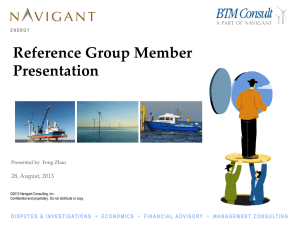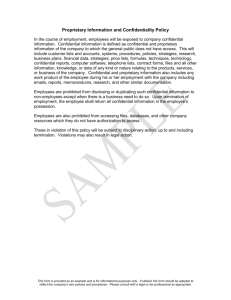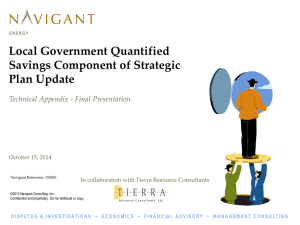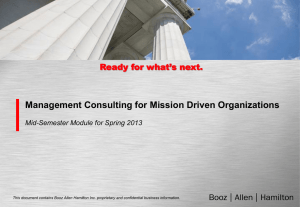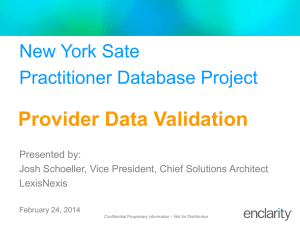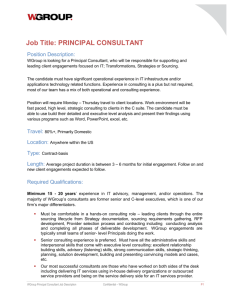Investigating Accounting Misconduct
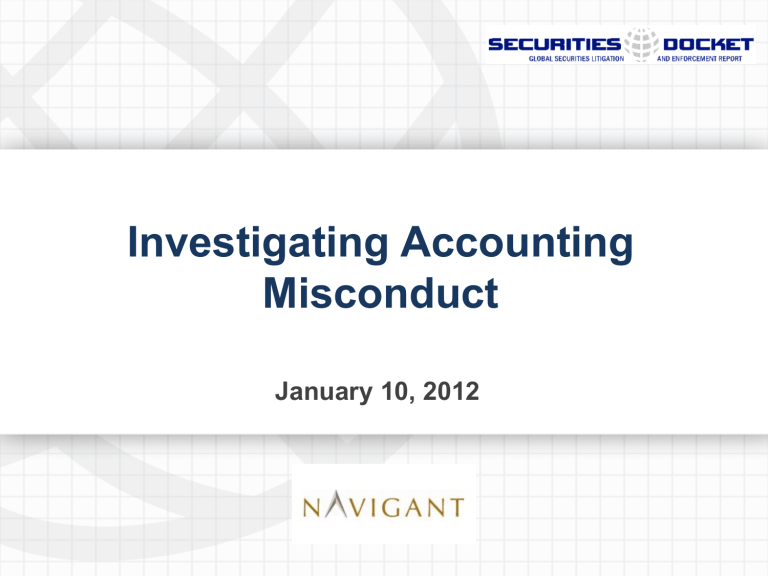
Investigating Accounting
Misconduct
January 10, 2012
Agenda
•
Introduction
•
Presentation
•
Questions and Answers ― (anonymous)
•
Slides ― now available on front page of Securities Docket
–
www.securitiesdocket.com
•
Wrap-up
Webcast Series
•
Approximately every other week
•
Thurs., January 12: “ Effective Insider Trading Policies for Public
Companies and Regulated Entities ”
Panel
Kevin Stephens, Managing Director
Navigant Consulting
John Geron, Managing Director
Navigant Consulting
Bradley Bondi, Partner
Cadwalader, Wickersham & Taft LLP
Martin Seidel, Partner
Cadwalader, Wickersham & Taft LLP
Page 4
Investigation of
Accounting
Misconduct
Presented by:
Kevin Stephens, Managing Director, Navigant Consulting,
John Geron, Managing Director, Navigant Consulting,
Bradley Bondi, Partner, Cadwalader , Wickersham & Taft LLP
Martin Seidel, Partner, Cadwalader, Wickersham & Taft LLP
January 10, 2012
Presented to: Securities Docket
This publication is the property of Navigant Consulting Inc. It should not be construed as professional advice on any specific facts or circumstances. The contents are intended for general educational and informational purposes only and may not be quoted or referred to in any publications or proceedings without the prior written consent of Navigant Consulting Inc., to be given or withheld at our discretion. To request reprint permission for this presentation, please contact the Navigant
Consulting Inc. office of General Counsel, at (312) 573-5600. The views set forth herein are the personal views of the author and do not necessarily reflect the views of
Navigant Consulting Inc.
To the extent that Cadwalader or Navigant have represented parties in cases that may be referenced in this webcast, the statements made during this webcast do not necessarily reflect the views of any clients or other members of Cadwalader or
Navigant.
Proprietary & Confidential Property of Navigant Consulting Inc.
Page 5
Table of Contents
Slide title should not be larger than
Palatino Linotype 24pt.
Section 1 » Accounting Misconduct and The
Economic Environment
Section 2 » Best Practices for Internal Investigations
Section 3 » Common Accounting Misconduct
Section 4 » Practicalities of Investigations
Section 5 » Recent SEC Enforcement Cases and
Focus
Proprietary & Confidential Property of Navigant Consulting Inc.
Page 6
Section 1
Page 7
Accounting Misconduct and the Economic Environment
Proprietary & Confidential Property of Navigant Consulting Inc.
Accounting Misconduct and the Economy
» Research indicates that as economic conditions degrade that reported frauds increase
1
.
» Increased risks of tone from the top issues, not accepting poor results caused by economy, hiding covenant failures, cost cutting impacting controls 3 , fraud operating model failures.
» The root causes of the economic downturn have led to increased regulation and regulatory powers notably Dodd-Frank.
» Recent update to seminal COSO study indicates fraud characteristics are changing
» CEO/CFO involvement: similar number of CEOs involved more CFO involvement
» Average length of a financial statement fraud increased from 24 months to 31 months
Proprietary & Confidential Property of Navigant Consulting Inc.
Page 8
Section 2
Page 9
Best Practices for Internal
Investigations
Proprietary & Confidential Property of Navigant Consulting Inc.
Best Practices for Internal Investigations
1. Take action quickly. The investigation can have an impact on financials, and there is a need to preserve evidence.
2. Determine whether to conduct an independent investigation or a management-led investigation.
3. Retain counsel that has experience with investigations and credibility with regulators.
4. Decide to whom the investigation team will report:
Audit Committee, Special Committee or Management.
5. Consider designating a liaison to the process owner
(Management/Audit or Special Committee) to manage day-to-day interactions with the investigation.
Proprietary & Confidential Property of Navigant Consulting Inc. Page 10
Best Practices for Internal Investigations
6. Keep stakeholders, including auditors and regulators, notified of the progress of the investigation.
— In independent investigations remember management is not the client.
7. Consider impact of the attorney-client privilege on the interactions with regulators and auditors.
8. Use the proper advisors and resources to assist the investigation team.
9. Where appropriate, keep management informed of process to limit disruptive impact the investigation has on the company.
Proprietary & Confidential Property of Navigant Consulting Inc. Page 11
Best Practices for Internal Investigations
10. Where applicable, maintain independence by excluding company personnel from investigatory interviews.
11. Do not have the investigation team share documents prior to or after interviews with individuals.
12. Meet preservation requirements for documents, and have investigation team responsible for collection.
13. Manage internal and external communications.
Encourage employees to cooperate with the investigation, and designate a spokesman to handle external questions.
Proprietary & Confidential Property of Navigant Consulting Inc. Page 12
Section 3
Page 13
Common Accounting
Misconduct
Proprietary & Confidential Property of Navigant Consulting Inc.
Common Accounting Misconduct
» Study of SEC AAERs 1982 to 2005 shows the percentage of AAERs that cite specific classes of accounting misconduct as follows: 2
» Misstated Revenue
» Capitalized Costs as Assets
54% of AAERs
27% of AAERs
» Other Expense/Shareholder Equity 25% of AAERs
» Misstated Accounts Receivable 19% of AAERs
» Misstated Inventory
» Misstated COGS
» Misstated Liabilities
13% of AAERs
11% of AAERs
7% of AAERs
» Misstated Reserve Account 6% of AAERs
» Misstated Allowance for Bad Debt 4% of AAERs
» Misstated Marketable Securities
» Misstated Payables
4% of AAERs
2% of AAERs
Proprietary & Confidential Property of Navigant Consulting Inc.
Page 14
Revenue Recognition
Criteria
» Revenue Recognition is a complex area and improper conduct can vary greatly. Some conduct involves real revenue that is prematurely recognized or artificially delayed to influence financial results, as well as the creation of entirely fictitious revenue.
» Generally revenue is recognizable when:
» Persuasive evidence of an arrangement exists
» Delivery and Performance have occurred
» There is a fixed or determinable sales price
» Collectability is reasonably assured
» Each of the above elements is subject to misapplication, manipulation or abuse in order to allow for revenue to be recognized
Proprietary & Confidential Property of Navigant Consulting Inc.
Page 15
Revenue Recognition
Types of Issues by Recognition Criteria
» Persuasive Evidence of an Arrangement exists
» Recognizing Revenue before a contract or purchase order is signed in order to increase current period results.
» Delivery and Performance have occurred
» Recognizing revenue for services that have not been rendered, such as advance billings with an understanding that, irrespective of the terms of the invoice, that it is not due until after actual delivery.
» Recognizing Revenue before physical delivery of the goods , Bill and Hold transactions, or the performance of required services, for example installation
» There is a fixed or determinable sales price
» Agreeing to repurchase unsold inventory to cover sales price reductions from resellers, especially when channel stuffing has occurred
» Recognizing revenue before rates or sales price is final
» Collectability is reasonably assured
» Making credit sales to entities that have no capacity to repay
Proprietary & Confidential Property of Navigant Consulting Inc.
Page 16
Revenue Recognition
Investigative Techniques
» Examination of Sales Patterns that spike at fiscal period ends
» Changes in historic patterns, Large transactions with new customers or related parties
» Significant changes in customer buying patterns may be indicative of customer channel stuffing
» Review of Inventory , credit notes and product returns trends
» Inventory levels not changing during periods of significant sales or significant increases in the level of product returns or issuance of credit-notes.
» Examination of unexplained growth in unbilled accounts receivables or increased aging of receivables
» Review A/R aging and unbilled A/R aging and WIP aging especially on milestone billing contracts and for customers with significant changes in purchasing behavior at fiscal period ends
» Analytical review of sales margins
» Look for unusually high or low margin sales , changes in customer margins at fiscal period end or in a commissioned sales environment sales without commissions
» Review of significant contracts for evidence of contract acceptance
» Review of any contemporaneous or reciprocal transactions for substance
Proprietary & Confidential Property of Navigant Consulting Inc.
Page 17
Revenue Recognition
Recent Cases
» Recent Cases:
» Securities and Exchange Commission v. Stuart W. Fuhlendorf , Civil
Action No. C-09-1292 (MJP) (W.D. Wash.) – 12/16/11 – Settlement
» The Commission’s complaint alleged that Fuhlendorf, the former Chief Financial
Officer of Isilon Systems, Inc. (“Isilon”), caused Isilon to improperly recognize revenue for multiple sales, including transactions with side agreements between
Isilon and its customers precluding revenue recognition under GAAP.
» Securities and Exchange Commission Administrative Proceeding File
No. 3-14249 In the Matter of Arthrocare Corporation 02/02/11 –
Consent Decree
» The Order finds that ArthroCare overstated and prematurely recognized revenue to certain of the company's agents and distributors.
» The Order indicated that most of these transactions occurred at or near quarter-end and were intended to help the company reach aggressive internal revenue targets and satisfy analysts' revenue expectations.
Proprietary & Confidential Property of Navigant Consulting Inc.
Page 18
Capitalized Costs as Assets and Other Expense
» Failure to Record Expenses, including invoices, customer rebates, settlements and side letter agreements.
» Over-Capitalization of Internally Developed Intangibles such as internally developed software and customer intangibles
» Failure to Recognize Impairments of Intangibles such as goodwill impairment, unfavorable leases, contract assets
» Overstated Assets in Course of Construction including capitalizing overhead and non productive labor to asset accounts
» Overstated Pre-Paid Assets including creating pre-paids for current period expenses , hanging labor or write-offs up in pre-paids
Proprietary & Confidential Property of Navigant Consulting Inc.
Page 19
Capitalized Costs as Assets and Other Expense
Investigative Techniques
» Failure to Record Expenses:
» Analysis of subsequent disbursements and vendor confirmations
» Over Capitalization of Intangibles
» Analytics surrounding growth in intangibles relative to contract growth and revenue projections
» Failure to Recognize Impairments of Intangibles
» Goodwill - Review stock price vs. enterprise NBV
» Review customer intangibles and tax assets against future contract cash flows and tax projections
» Overstated Assets in Course of Construction
» Review AICC and understand purpose for the AICC and how it will be recovered
» Overstated Pre-Paid Assets
» Understand the substance of all pre-paid accounts and preview growth in aggregate prepaid balances and review reconciliations for accounts with significant or unusual growth
Proprietary & Confidential Property of Navigant Consulting Inc.
Page 20
Capitalized Costs as Assets and Other Expense
Recent Cases
» Securities and Exchange Commission v. Rebecca Lynn Higgins, Civil
Action No. 3:11-cv-763 (N.D. Tex.) 04/14/11 – settled case
» The Commission’s complaint alleges that, between 2004 and 2009, Higgins, a former vice president of marketing at Zale Corporation, caused Zale to record certain television advertising costs as prepaid advertising when, in fact, those costs should have been expensed in the periods in which they were incurred.
» Accounting and Auditing Enforcement Release No. 3219 / December 20,
2010 SEC v. Joseph M. Elles, Civil Action No. 1:10-CV-4118 (U.S. District
Court for the Northern District of Georgia) – pending action
» The Securities and Exchange Commission charged Joseph M. Elles, a former
Executive Vice President of Carter’s, Inc., the Atlanta-based marketer of children’s clothing, for engaging in financial fraud.
» The complaint alleges that Elles fraudulently manipulated the amount of discounts that Carter’s granted to its largest wholesale customer in order to induce that customer—itself a large national department store—to purchase greater quantities of
Carter’s clothing for resale.
» The complaint also alleges that Elles then concealed his conduct by persuading the customer to defer subtracting the discounts from payments until later periods and creating and signing false documents misrepresenting the timing and amount of those discounts to Carter’s accounting personnel.
Proprietary & Confidential Property of Navigant Consulting Inc.
Page 21
Misstated Reserves
» GAAP requires accrual of liabilities if they are probable and reasonably estimable, and relate to a historic event that requires one or more future events to confirm the amount or existence (SFAS 5/ASC450).
» The significant judgment surrounding the estimation of both probability of occurring as well as the estimate can create opportunities for abuse.
» Primary abuses include:
» Not accruing for known contingencies,
» Accruing excess contingencies
» Failing to release unneeded accruals, in periods with strong operating performance and subsequently releasing the excess accruals to support future operating performance.
Proprietary & Confidential Property of Navigant Consulting Inc.
Page 22
Misstated Reserves
Investigative Techniques
» Obtain and Review account reconciliations for accrued expense accounts;
» Examine significant, round dollar amount transactions especially those occurring at or around the end of fiscal periods
» Review account and journal descriptions, and journal entry support for substantiation.
» Look for other signs of unusual activity such as vague accrual names
» Examine the ratio of reserve accruals/releases to pre-tax income and analyst consensus/budget figures to assess quality of earnings and if a relationship between performance and releases/accruals exists.
» Compare significant settlements or judgments with historic accruals and legal representation letters.
Proprietary & Confidential Property of Navigant Consulting Inc.
Page 23
Misstated Reserves
Recent Cases
» Securities and Exchange Commission v. Dell Inc., Michael S.
Dell, Kevin B. Rollins, James M. Schneider, Leslie L. Jackson,
Nicholas A.R. Dunning, Civil Action No. 1:10-cv-01245 (D.D.C.)
» Alleged reserve manipulations allowed Dell, Inc. to materially misstate its earnings and its operating expenses as a percentage of revenue.
» Dell Inc. paid a $100 million penalty and consented to the entry of an order permanently enjoins it from violating sections of the Securities and Exchange Act.
» Securities and Exchange Commission v. James O’Leary, CPA - complaint filed 8/30/2011
» SEC obtained claw back of compensation from CFO, not involved in misconduct, related to alleged accounting fraud at Beazer in which reserves for certain future homebuilding expenses were improperly established, inflated and/or maintained, so that they could later be used.
Proprietary & Confidential Property of Navigant Consulting Inc.
Page 24
Round Trip Transactions
Overview
» Round Trip Transactions can be designed to accomplish a variety of financial statement manipulations.
» Common characteristic of round trip is that the item is returned, generally with some level of fee being charged by the counterparty.
» Refco Securities - Round trip loans used to hide over $400mm of intercompany loans. Refco made unsecured customer loans, had the customers lend the money to Refcos parent which repaid its loans and then after the quarter unwound the loans with an interest payment to the customer.
» AIG and Brightpoint – Retroactive “insurance policy” to cover a
$15million loss sold by AIG to Brightpoint for approximately $15 million.
Per AAER No. 1858 “It was merely a "round-trip" of cash — a mechanism for Brightpoint to deposit money with AIG, in the form of monthly
"premiums," which AIG was then to refund to Brightpoint as purported
"insurance claim payments.“
» Krispy Kreme Doughnuts – Per AAER 2941 - Krispy Kreme engaged in a round-trip transaction in connection with the reacquisition of franchises by paying money to the franchisee with the understanding that the franchisee would return the money in a manner that allowed Krispy
Kreme to record revenue or avoid a loss.
Proprietary & Confidential Property of Navigant Consulting Inc.
Page 25
Round Trip Transactions
Investigative Techniques
» Review significant transactions with customers who are also vendors.
» Follow the Money -Understand the economics of the arrangements. If the cash flows both ways, compare NPV of the cash flows using market rates.
» Understand the commercial reasonableness of the arrangement, and the level of continuing involvement of the parties.
» Understand if normal process are not being followed and controls are being waved, e.g. credit limit to customers waived, no security for a loan to a customer whose then increases purchases, non-standard payment terms
» Consider why features like credit enhancements, parental guarantees, or collateral would be required in an arms length sale agreement.
» Are unusual credit notes or payments from vendors received in one period with increased vendor payments in subsequent periods
Proprietary & Confidential Property of Navigant Consulting Inc. Page 26
Section 4
Page 27
Practicalities of Investigations
Proprietary & Confidential Property of Navigant Consulting Inc.
Seaboard Factors and Importance of Cooperation
In October 2001, the SEC released a policy statement concerning the factors the
Commission would evaluate in determine whether to bring an enforcement action against a company and how it would credit a company’s cooperation.
The report is commonly referred to as the “Seaboard Report.” In the Matter of
Gisela de Leon-Meredith (Release No. 44969, October 23, 2001). The Seaboard
Report remains the operative document for how the Commission evaluates charging a company, as reiterated recently in the SEC’s Enforcement Manual
(p.100).
In Seaboard, the Commission indicated it would evaluate four factors with 13 sub-factors in assessing whether and how to charge a company:
1. Self-Policing
2. Self-Reporting
3. Remediation
4. Cooperation
Proprietary & Confidential Property of Navigant Consulting Inc. Page 28
Interactions between Lawyer and Forensic Accountant
• The work of forensic accountants must be directed and supervised by lawyers.
• Careful consideration should be given to protect the attorney-client privilege and attorney work product.
• Forensic accountants serve an important role in supporting attorneys during interviews and reviewing accounting data.
• In some instances, counsel should consider sharing certain, limited work product created by the forensic accountant with the SEC and the company.
• Special care should be given to notify the company of any accounting errors that require adjustment.
Page 29
Proprietary & Confidential Property of Navigant Consulting Inc.
Private Shareholder Litigation
• Accounting misconduct inevitably will spawn shareholder litigation based upon the same or similar misconduct to that at issue in the SEC or independent investigation.
Responding to the SEC and conducting the investigation must take into account these actions.
• Materials provided to the SEC (including reports or presentation materials used in meetings) are generally discoverable.
• Care needs to be taken to ensure that determinations regarding the knowledge, intent or motives of company personnel are carefully considered to avoid ascribing motives without adequate support.
• Where separate counsel represents the company in litigation than in the independent investigation, careful coordination between counsel is critical to avoiding missteps.
This is especially important if the company is conducting an independent investigation and responding to shareholder demands or derivative actions, where the work of the independent investigation may be leveraged to prevent or terminate the action.
Page 30
Proprietary & Confidential Property of Navigant Consulting Inc.
Selection of Individual Counsel
• Individuals may request or need individual counsel. Investigating counsel may have a professional responsibility to ensure that individuals are properly represented.
• Once an individual requests counsel or it becomes evident that the individual should have counsel, investigating counsel should move promptly to ensure that the company retains counsel for them.
• It is appropriate to identify counsel with the skill and experience to represent individuals who face legal exposure in complex accounting matters.
• Cooperation and coordination with individual counsel is an important balancing act.
Page 31
Proprietary & Confidential Property of Navigant Consulting Inc.
Section 5
Page 32
Recent SEC Enforcement
Cases and Focus
Proprietary & Confidential Property of Navigant Consulting Inc.
Recent SEC Enforcement Cases
Citibank - “Neither Admit nor Deny”
» SEC v. Citigroup Global Markets, Inc., Case No. 11 Civ 7387 (S.D.N.Y.) :
» Judge Rakoff rejects the SEC proposed settlement with the
Citibank, currently on appeal with 2 nd circuit.
» One rationale for cooperating with the SEC under Seaboard is to significantly shorten the investigative process and lead to reduced penalties.
» If companies are not allowed to settle with the SEC by neither admitting or denying the conduct and are forced to go to trial or admit to violative conduct will they continue to cooperate.
» Recently announced policy change to not allow “neither admit nor deny” settlements in cases with criminal convictions appears to be derived from logic applied by
Rakoff.
Proprietary & Confidential Property of Navigant Consulting Inc.
Page 33
Recent SEC Enforcement Cases
Dell - Reserves
» Securities and Exchange Commission v. Dell Inc.,
Michael S. Dell, Kevin B. Rollins, James M. Schneider,
Leslie L. Jackson, Nicholas A.R. Dunning, Civil Action
No. 1:10-cv-01245 (D.D.C.)
» The SEC’s complaint further alleged that Dell’s most senior former accounting personnel engaged in improper accounting by maintaining a series of “cookie jar” reserves that it used to cover shortfalls in operating results from FY 2002 to FY 2005.
» The complaint alleges that Dell’s fraudulent accounting made it appear that it was consistently meeting Wall Street earnings targets and reducing its operating expenses through the company’s management and operations. .
» Dell Inc. paid a $100 million penalty and consented to the entry of an order permanently enjoins it from violating sections of the Securities and Exchange Act.
Proprietary & Confidential Property of Navigant Consulting Inc.
Page 34
Recent SEC Enforcement Cases
LaBarge – POC Accounting
• In the Matter of LABARGE, INC. , AAER 3297 06/30/11
LaBarge did not implement and maintain adequate internal controls relating to its cost estimates for long-term contracts
LaBarge did not maintain contemporaneous documentation supporting its changes to cost estimates on long-term contracts and it failed to keep books and records
As a result of the above LaBarge misstated its financial statements
Cease and Desist from future violations and $200,000 fine
Proprietary & Confidential Property of Navigant Consulting Inc.
Page 35
Recent SEC Enforcement Cases
Thor Industries – Requirement for Independent Review
» Thor Industries (AAER – 3280 -May 13, 2011) According to the AAER:
» Subsidiary VP of Finance understated costs of goods sold to conceal inventory costs not reflected in the subsidiary’s accounting records.
» The error was hidden through the use of unsupported manual journal entries.
» Thor restated financial statements to reduce reported pre-tax income for 2003-2007 by $27 million.
» Thor was already subject to a 1999 Commission cease-anddesist order related to internal controls and as a part of the settlement was required to retain an independent consultant to review and evaluate certain of its internal controls and record-keeping policies and procedures.
Proprietary & Confidential Property of Navigant Consulting Inc.
Page 36
Recent SEC Enforcement Cases
GSI Group, Inc. – Cooperation and Remediation Limit Sanctions
» GSI Group, Inc. (AAER 3283 - May 13, 2011) Per the AAER
» GSI overstated revenues for the years 2004-2008 by approximately $75 million.
» Revenue was not recorded in accordance with GAAP because
»
» sales personnel made undocumented
commitments to customers accounting personnel did not have sufficient information to make appropriate determinations regarding the timing of revenue recognition
» Based on remedial actions taken and cooperation, sanction against GSI was limited by the SEC to a cease-and-desist order.
Proprietary & Confidential Property of Navigant Consulting Inc.
Page 37
Recent SEC Enforcement Cases
Isilon Systems – 3 year bar for CFO ; Cease and Desist for Company
» Isilon Systems Inc. (AAER 3050 - December 16, 2011) – AAER alleges:
» Isilon restated its financial statements for 2006-2007 to reduce reported revenue by $7 million.
» SEC Complaint alleged that revenue was improperly recorded due to
» “round trip” transactions
» oral side agreements with resellers
» Former CFO settled and agreed to be barred for three years.
» Isilon agreed to Cease and Desist from violating securities laws .
Proprietary & Confidential Property of Navigant Consulting Inc.
Page 38
Endnotes
» 1 Predicting Material Accounting Manipulations, Contemporary Accounting Research
Vol. 28 No. 1 (Spring 2011) Dechow, Ge, Larson, and Sloan
» 2 Ibid.
» 3 Occupational Fraud: a study of the impact of an economic recession, Association of
Certified Fraud Examiners
» 4 Fraudulent Financial Reporting 1998-2007, an analysis of U.S. Public Companies,
Committee of Sponsoring Organizations of the Treadway Commission, May 2010
Beasley, Carcello, Hermanson, Neal
Proprietary & Confidential Property of Navigant Consulting Inc. Page 39
Presenter Bios
Kevin Stephens
Managing Director , Navigant Consulting
Mr. Stephens is a Managing Director in Navigant’s Washington, DC office. He has over 20 years of experience in the areas of accounting, auditing and consulting with extensive expertise in accounting, financial reporting and SEC enforcement matters. During his career, Mr. Stephens has supervised and conducted a wide range of financial consulting services including audits, expert witness testimony, independent investigations and white collar criminal defense. He has provided these services to public and private companies across a broad range of industries as well as individual defendants. Prior to joining Navigant, Mr. Stephens was a Director in the Disputes and Investigations practice of an international accounting firm.
More recently, Mr. Stephens has provided consultative support in numerous sensitive situations involving litigation and/or regulatory investigations. His experience in these matters involve analysis and assessment of causation and evaluation of the relevant accounting, auditing and financial reporting issues. Mr. Stephens is a Certified Public
Accountant, Certified in Financial Forensics, and a Certified Fraud Examiner.
Proprietary & Confidential Property of Navigant Consulting Inc. Page 40
Presenter Bios
John Geron
Managing Director, Navigant Consulting
Mr. Geron is a Managing Director in Navigant’s New York, NY office. He has over 40 years of experience in the areas of accounting, auditing and consulting with extensive expertise in financial reporting matters. During his career, Mr.
Geron has supervised and conducted a wide range of financial reporting services including audits, internal control assessments and other comprehensive reviews. He has provided these services to both public and private companies across a broad range of industries. Prior to joining Navigant, Mr. Geron was the Managing Practice Director of the
Global Assurance practice of an international accounting firm.
More recently, Mr. Geron has provided consultative support in numerous sensitive situations involving litigation and/or regulatory investigations. His experience in these matters involve analysis and assessment of causation and evaluation of the relevant accounting, auditing and financial reporting issues. Mr. Geron currently has a leadership role in Navigant’s Disputes & Investigations practice in the area of Forensic Financial Accounting. He is a certified public accountant and is a member of several professional associations.
Proprietary & Confidential Property of Navigant Consulting Inc. Page 41
Presenter Bios
Bradley J. Bondi
Partner, Cadwalader, Wickersham & Taft LLP
Brad Bondi has extensive experience representing companies and financial services firms in regulatory enforcement matters brought by the Securities and Exchange Commission and the Department of Justice. He has experience dealing with whistleblowers and counseling companies on relating compliance and investigative decisions.
At the investigative stage, he designs and leads internal investigations for international companies in different regions of the world and on a variety of topics, including suspected violations of securities laws, accounting irregularities, internal controls, market manipulation, revenue recognition issues, tax-related matters, suspected violations of the
FCPA, commercial bribery, and potential antitrust concerns. He also assists companies in ensuring appropriate reporting and remedial steps are taken to address any discovered problems.
Prior to joining Cadwalader, he served on the executive staff of the Securities and Exchange Commission as enforcement counsel to two SEC commissioners. He also served as member of the steering committee for the SEC's
"Strategic Plan for Fiscal Years 2010-2015" and on several working groups related to enforcement initiatives.
Proprietary & Confidential Property of Navigant Consulting Inc. Page 42
Presenter Bios
Martin L. Seidel
Partner, Cadwalader, Wickersham & Taft LLP
Martin Seidel is a partner in Cadwalader’s Litigation Department. He focuses on complex commercial litigation and arbitration, with an emphasis on multiparty class and derivative suits and corporate control contests.
Mr. Seidel has represented underwriters, investment advisers, issuers, and corporate directors and officers in state and federal courts throughout the United States, arbitral tribunals in the U.S. and Europe, and before the U.S. Securities and Exchange
Commission, the U.S. Department of Justice, the U.S. Federal Trade Commission, the
NASD, the New York Stock Exchange, as well as in investigations by state and federal prosecutors and state Attorneys General throughout the U.S. Mr. Seidel has represented key players in the highest profile corporate governance and securities litigations and investigations of the past decade, including Adelphia, Enron, Interstate Bakeries, Hollinger, and HealthSouth.
Proprietary & Confidential Property of Navigant Consulting Inc. Page 43
